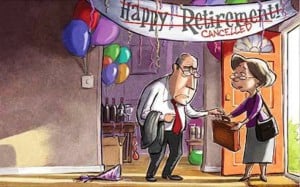 People mean well and many can’t resist giving advice, but when it comes to financial matters ONLY take financial advice from a qualified professional. Here are some classic examples of financial advice that you should never follow.
People mean well and many can’t resist giving advice, but when it comes to financial matters ONLY take financial advice from a qualified professional. Here are some classic examples of financial advice that you should never follow.
- Don’t declare bankruptcy because it will ruin your credit rating. While it’s true that bankruptcy remains on your credit report for quite a while, if you aren’t paying your credit cards and other loans on time, your credit rating is probably already shot. With an insolvency process, we can provide you with easy ways to start rebuilding your credit fast. Without such a process, you will never get out from under your debt and won’t be able to rebuild your credit rating.
- Credit cards will get you into trouble. Credit cards won’t get you into trouble if you charge only what you can afford to pay off. In fact, credit cards can help you to establish a credit history which future lenders will use when you want to take out a loan or a mortgage. Without a credit history you may find it very difficult to borrow money.
- A house is always a great investment. Houses are not immune from market fluctuations. The prices of real estate are tied to changing demographics, interest rate spikes and the economy. There is no guarantee that your house will have increased in value at the point in time when you need to sell. Depending on the state of the real estate market when you purchase a home, there is always a possibility that your home may not increase in value and may even decrease in value from time to time, so don’t purchase the house because you need the increased value to be liquid on a specific date.
- You can live for free if you buy an investment property and rent it out. Television shows on the Home & Garden channel have gone to perpetuate this bad advice. It’s not as easy as it seems on a one hour TV show and it’s a difficult and potentially financially hazardous route to take. Renovations almost always go over budget, so count on spending more than you planned on. Not every tenant is a jewel. Some are extremely difficult and can cost you a lot of time and money. Once you become a landlord you will have to manage your property. You just don’t find a tenant and expect that the property will manage itself. Expect to be called whenever something is not perfect and your tenant will expect immediate action. Be prepared for unexpected expenses.
- Asking all your friends where can I get a loan with bad credit in Toronto. The lenders that would lend money to someone with debt problems and bad credit already charge extremely high upfront fees, very high interest rates and usually, you will never be able to pay off the loan and perhaps you will even fall behind on interest payments. The collection efforts of these types of lenders are not subtle or pleasant.
- Student debt is good debt. Debt is debt, and borrowing more than you can repay is never a good idea. The Canadian Federation of Students estimates that average student debt is almost $28,000. According to the Canada Student Loan Program, most students take 10 years to pay off their loans. Does this sound like a good idea? We are certainly not advocating that students don’t pursue post secondary education, but keep the debt to a minimum by going to a more affordable college or university. Work part time during the school terms and full time during vacations.
When you need financial advice seek out a professional. Taking bad advice can be costly. If you are experiencing serious debt issues contact a trustee for advice. Ira Smith Trustee & Receiver Inc. is a full service insolvency and financial restructuring practice serving companies and individuals throughout the Greater Toronto Area (GTA) facing financial crisis or bankruptcy that need a plan for Starting Over, Starting Now. We will give you sound financial advice that you can count on.








